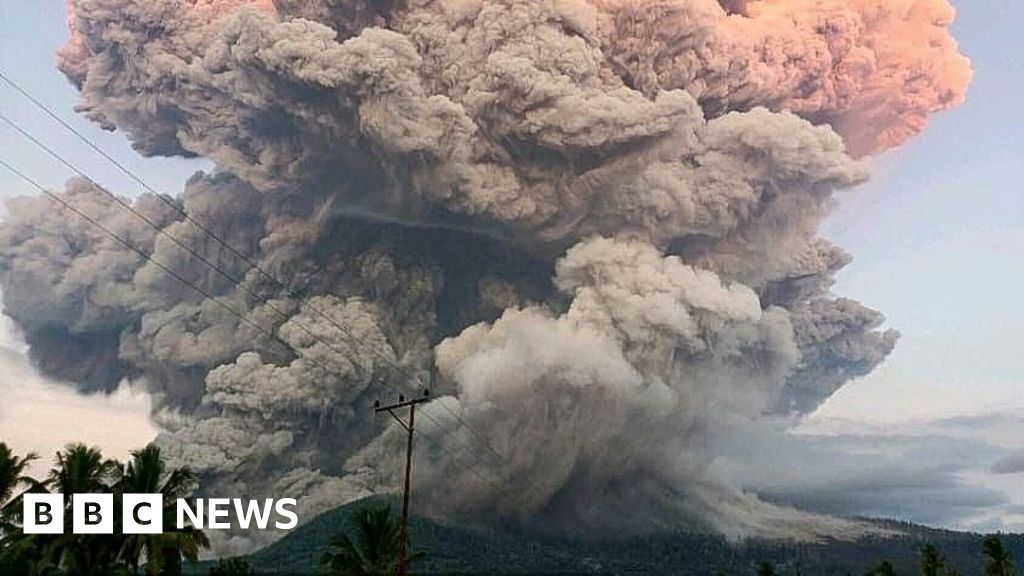One of Indonesia's most active volcanoes spewed a huge ash cloud more than 11 kilometres into the sky on Tuesday after officials issued the country's highest alert. Mount Lewotobi Laki-Laki, erupted at 17:35 local time (10:35 BST), the country's volcanology agency said, sending the vast cloud above the tourist island of Flores. A 7km exclusion zone was in place around the crater of the 1,584m (one mile) high twin-peaked volcano. There were no immediate reports of damage or casualties. The volcano erupted multiple times in November, killing nine people and forcing thousands to flee. The ash cloud also forced flight cancellations. Geology agency head Muhammad Wafid said no one should carry out any activities within 7km of the eruption, and warned of potential lahar floods - a type of mud or debris flow of volcanic materials - if heavy rain occurs. Residents were also urged to wear face masks to protect themselves from volcanic ash. The National Disaster Mitigation Agency meanwhile said that at least one village had been evacuated, and ash rain was reported in several others outside the exclusion zone. A spokesman called on residents around the volcano "to evacuate to safe locations" as tremors were still being detected, which indicated ongoing volcanic activity. Lewotobi Laki-laki's last eruption was in May, when authorities also raised the level to the most severe. Laki-Laki, which means "man" in Indonesian, is twinned with the calmer but taller 1,703m named Perempuan, the Indonesian word for "woman".
Indonesia issues highest alert as volcano erupts
TruthLens AI Suggested Headline:
"Mount Lewotobi Laki-Laki Erupts, Prompting Highest Alert in Indonesia"
TruthLens AI Summary
On Tuesday, Indonesia's Mount Lewotobi Laki-Laki erupted, sending a massive ash cloud soaring over 11 kilometers into the atmosphere, prompting officials to issue the nation's highest alert level. The eruption occurred at 17:35 local time and was confirmed by the country's volcanology agency. As a precautionary measure, a 7-kilometer exclusion zone was established around the volcano, which stands at 1,584 meters. While there were no immediate reports of damage or injuries following the eruption, the situation remains serious. This volcano has a history of activity, with its previous eruptions in November resulting in nine fatalities and the evacuation of thousands from surrounding areas. The ash cloud from the recent eruption has already caused flight cancellations, highlighting the broader impact of volcanic activity on both local and international travel.
Authorities, including the head of the geology agency, Muhammad Wafid, advised residents to avoid the exclusion zone and warned of potential lahar floods, which can occur if heavy rainfall follows the eruption. Residents living nearby were urged to wear face masks to mitigate the health risks posed by volcanic ash. The National Disaster Mitigation Agency reported that at least one village has been evacuated, and ash rain has affected several communities outside the exclusion zone. Tremors are still being detected, indicating ongoing volcanic activity, and officials are advocating for residents around the volcano to relocate to safer areas. Mount Lewotobi Laki-Laki, which is often associated with its twin, the taller and calmer Mount Lewotobi Perempuan, last erupted in May, leading to similar precautionary measures being taken at that time.
TruthLens AI Analysis
You need to be a member to generate the AI analysis for this article.
Log In to Generate AnalysisNot a member yet? Register for free.
